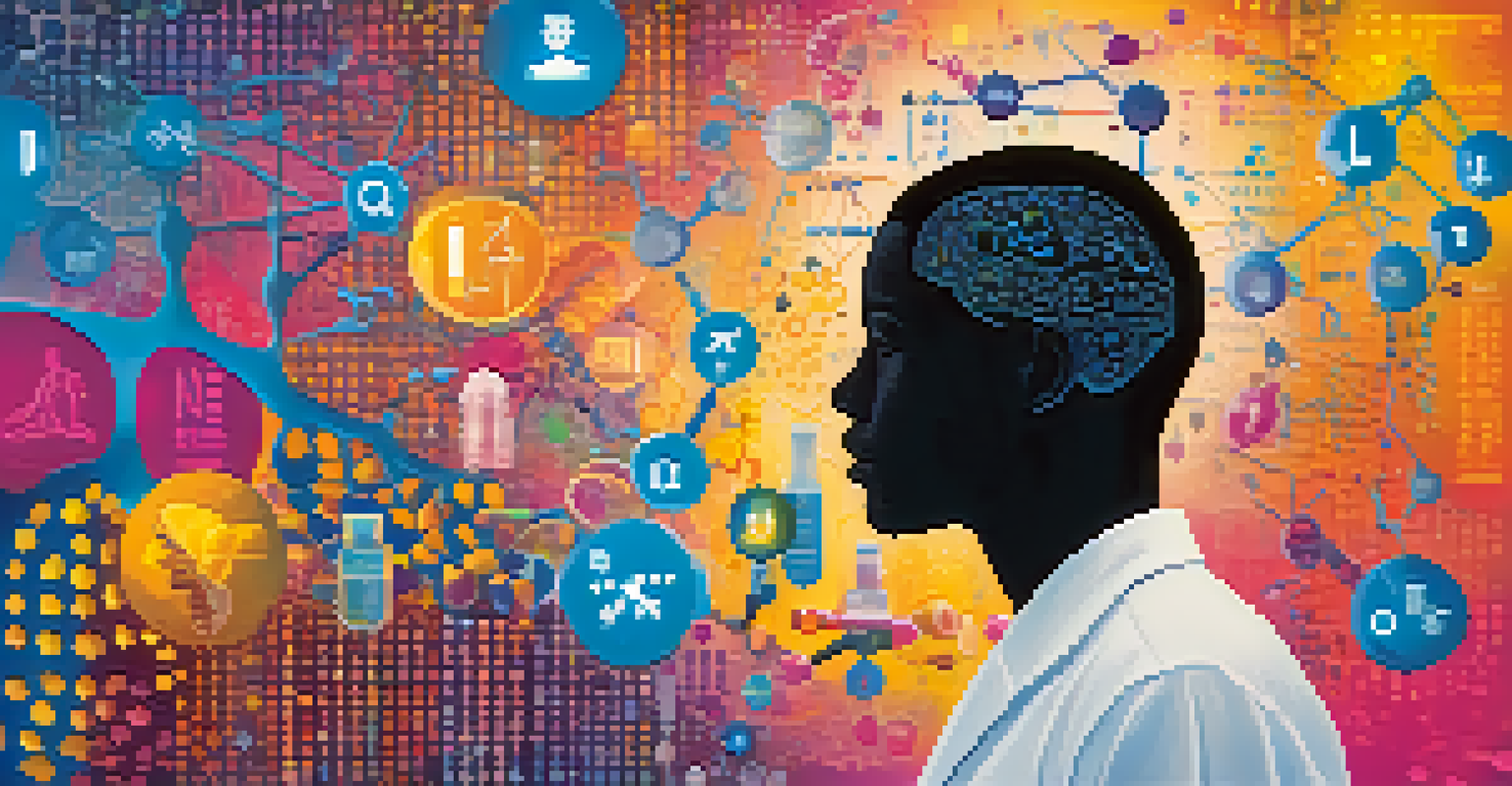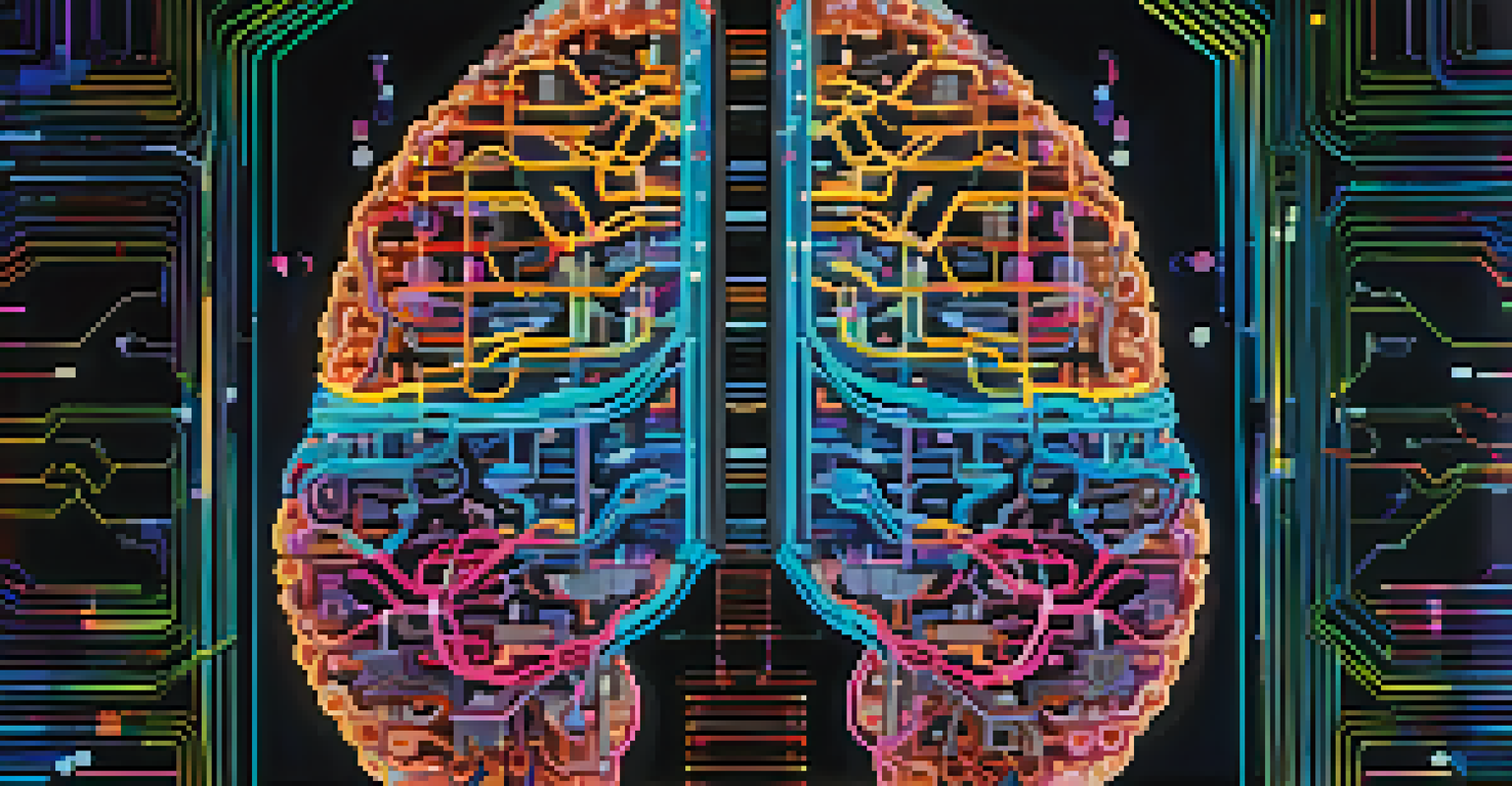AI and Genomics: Personalizing Treatment Based on Genetics

Understanding Genomics: The Blueprint of Life
Genomics is the study of an organism's complete set of DNA, including all of its genes. This fascinating field provides insights into our biological makeup, helping researchers understand how genetic variations can influence health. By decoding the information contained in genes, scientists can identify patterns that may lead to diseases or influence treatment effectiveness. Essentially, genomics serves as the foundation for personalized medicine, enabling healthcare to move from a one-size-fits-all approach to more tailored treatments.
Genomics is the key to personalized medicine, allowing us to tailor treatments based on individual genetic profiles.
With the rapid advancement of technology, particularly in sequencing methods, we can now analyze large volumes of genomic data quickly and accurately. This ability not only helps in identifying genetic disorders but also opens doors to preventive measures and targeted therapies. It’s like having a detailed map of our body’s biological landscape, allowing us to pinpoint areas that require attention. The more we understand our genetic makeup, the better equipped we are to tackle health challenges head-on.
As genomics continues to evolve, its integration with artificial intelligence (AI) is revolutionizing the field. AI algorithms can sift through vast amounts of genomic data at lightning speed, identifying correlations and patterns that might take humans years to uncover. This synergy has the potential to enhance diagnostic accuracy and improve patient outcomes, making it an exciting frontier in modern medicine.
The Role of AI in Analyzing Genetic Data
Artificial intelligence has become a powerful ally in the field of genomics. With its ability to learn from data and make predictions, AI can help researchers identify genetic mutations linked to various diseases. By analyzing patterns in genetic sequences, AI systems can recognize anomalies that may not be immediately apparent to human analysts. This capability is crucial, especially when dealing with complex diseases like cancer, where numerous genetic factors are at play.

Moreover, AI can enhance the speed and efficiency of genomic analysis. Traditionally, interpreting genomic data was a time-consuming and resource-intensive task. Now, with AI tools, researchers can automate many aspects of data processing, allowing them to focus on interpretation and application. Imagine having a super-smart assistant that can crunch numbers and sift through data, presenting you with only the most relevant findings—this is what AI brings to the table.
Genomics: The Key to Personalized Medicine
Genomics allows for tailored healthcare by understanding individual genetic profiles to improve treatment efficacy and reduce side effects.
Through machine learning, a subset of AI, models can be trained on existing genomic data to predict how certain genetic variations might affect an individual's response to treatments. This predictive power can lead to more refined and effective therapeutic strategies, significantly improving patient care and minimizing trial-and-error approaches in medication.
Personalized Medicine: Tailoring Treatments to Individuals
Personalized medicine is the practice of customizing healthcare, with decisions tailored to the individual patient based on their genetic information. This approach recognizes that each person’s genetic makeup is unique, which can significantly influence how they respond to medications and treatments. Instead of prescribing a standard treatment plan, healthcare providers can now make informed decisions that align with a patient's genetic profile, ensuring higher efficacy and fewer side effects.
Artificial intelligence is revolutionizing healthcare by enabling us to analyze genetic data in ways we never thought possible.
For instance, in oncology, understanding a patient's genetic mutations can guide oncologists in selecting targeted therapies that are more likely to be effective for that specific individual. This tailored approach not only enhances treatment success rates but also minimizes unnecessary treatments that may not work for certain patients. It’s like having a bespoke suit—crafted to fit perfectly rather than a generic one that may not suit your style.
Furthermore, personalized medicine extends beyond treating existing conditions; it also plays a crucial role in preventive care. By analyzing genetic risks, healthcare providers can recommend lifestyle changes or preventive measures tailored to the individual’s predispositions. This proactive approach empowers patients to take charge of their health, potentially preventing diseases before they manifest.
Ethical Considerations in AI and Genomics
As we delve deeper into the intersection of AI and genomics, ethical considerations emerge as a crucial topic. The ability to access and analyze genetic data raises concerns about privacy, consent, and data security. Patients must feel confident that their sensitive genetic information is handled responsibly and that they have control over how it is used. Transparency in how data is collected and utilized is essential to building trust in these advanced technologies.
Moreover, the potential for genetic discrimination is another pressing ethical issue. If employers or insurance companies gain access to genomic data, there is a risk of individuals facing bias based on their genetic predispositions. This highlights the need for robust legal frameworks that protect individuals from discrimination and ensure equitable access to healthcare based on their genetic information.
AI Enhances Genomic Data Analysis
Artificial intelligence accelerates the identification of genetic mutations and patterns, improving diagnostic accuracy and treatment strategies.
Lastly, there’s the question of equitable access to these groundbreaking treatments. As personalized medicine powered by AI advances, it’s vital to ensure that all populations can benefit from these innovations, regardless of socioeconomic status. Bridging the gap in healthcare access will require collective efforts from governments, healthcare providers, and technology developers to create inclusive solutions.
AI-Driven Drug Discovery: Revolutionizing Treatment Development
AI is not only transforming how we understand genomics but also how we develop new drugs. The traditional drug discovery process can be lengthy and costly, often taking over a decade before a new medication reaches the market. However, AI algorithms can analyze vast datasets to identify potential drug candidates much faster, streamlining the entire process. It’s akin to having a supercharged research assistant who can sift through mountains of data in a fraction of the time.
By utilizing machine learning and predictive modeling, AI can help researchers understand how different compounds interact with specific genetic targets. This insight allows for the rapid identification of promising drug candidates and the optimization of their efficacy. Imagine being able to zero in on the most effective treatment options within days instead of years—this is the promise of AI in drug discovery.
Moreover, AI can also aid in repurposing existing drugs for new therapeutic uses. By analyzing genetic data and existing treatment outcomes, researchers can discover that a drug originally designed for one condition may be effective for another. This not only accelerates treatment availability but also reduces costs associated with developing new medications from scratch.
The Future of AI and Genomics in Healthcare
The future of AI and genomics in healthcare is incredibly promising, with the potential to revolutionize how we diagnose, treat, and prevent diseases. As technology continues to evolve, we anticipate even more sophisticated AI models that can provide deeper insights into genetic data. This progress could lead to breakthroughs in understanding complex diseases, enabling healthcare professionals to deliver even more targeted and effective treatments.
Additionally, as patient awareness and acceptance of personalized medicine grow, we can expect increased collaboration between patients, healthcare providers, and researchers. This collaborative spirit will foster an environment where innovative ideas can flourish, ultimately leading to more effective healthcare solutions. It’s like building a community where everyone contributes their strengths to achieve a common goal.
Ethics in AI and Genomics Matter
Navigating the ethical considerations of genetic data use is crucial to ensure patient privacy, prevent discrimination, and promote equitable access to healthcare.
However, for these advancements to be realized, ongoing education and training will be necessary for healthcare professionals to keep pace with the rapid developments in AI and genomics. As we stand on the brink of this new era in medicine, the integration of technology and genetics holds the potential to improve patient outcomes significantly and redefine the landscape of healthcare as we know it.
Conclusion: Embracing the New Era of Personalized Healthcare
In conclusion, the integration of AI and genomics is paving the way for a new era in personalized healthcare. By harnessing the power of genetic data, we can tailor treatments to individual patients, improving outcomes and minimizing adverse effects. This personalized approach represents a significant shift from traditional medical practices, emphasizing the importance of understanding each patient's unique genetic makeup.
As we continue to navigate the ethical challenges and technological advancements in this field, it’s crucial to prioritize patient trust and equity in healthcare access. The collaboration between technology developers, healthcare providers, and patients will be essential for realizing the full potential of AI-driven genomics in medicine. Together, we can ensure that everyone benefits from these innovations.

Ultimately, the future of healthcare lies in our ability to embrace these changes and leverage the insights provided by AI and genomics. By doing so, we are not only enhancing our understanding of human health but also empowering individuals to take charge of their wellness journey, leading to a healthier and more informed society.